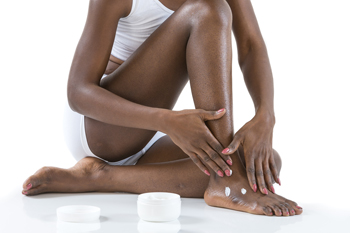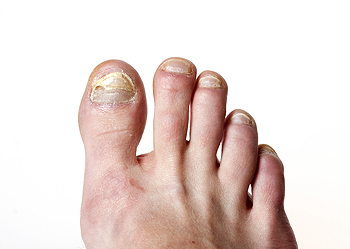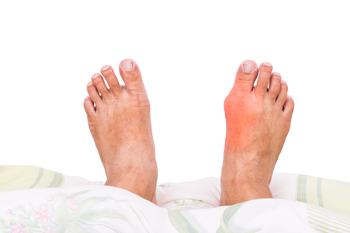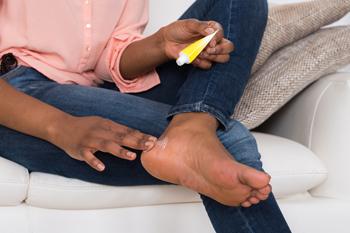Items filtered by date: January 2021
Why Is Daily Foot Care Important?
 Daily foot care is important for maintaining the health of your hard working feet. A good foot care routine starts with washing the feet with soap and water, drying them thoroughly, and applying a good moisturizer to prevent dry skin. Soaking the feet can be incorporated into your foot care routine on days when your feet are sore or swollen following a strenuous workout or standing for a prolonged period of time. Watching out for signs of foot injury or damage is also important. Foot pain and changes in the appearance of the feet can be indicative of a variety of medical conditions. For more information about daily foot care practices, please consult with a podiatrist.
Daily foot care is important for maintaining the health of your hard working feet. A good foot care routine starts with washing the feet with soap and water, drying them thoroughly, and applying a good moisturizer to prevent dry skin. Soaking the feet can be incorporated into your foot care routine on days when your feet are sore or swollen following a strenuous workout or standing for a prolonged period of time. Watching out for signs of foot injury or damage is also important. Foot pain and changes in the appearance of the feet can be indicative of a variety of medical conditions. For more information about daily foot care practices, please consult with a podiatrist.
Everyday foot care is very important to prevent infection and other foot ailments. If you need your feet checked, contact Dr. John P. Beaupied from Palos Podiatry. Our doctor can provide the care you need to keep you pain-free and on your feet.
Everyday Foot Care
Often, people take care of their bodies, face and hair more so than they do for their feet. But the feet are a very important aspect of our bodies, and one that we should pay more attention to. Without our feet, we would not be able to perform most daily tasks.
It is best to check your feet regularly to make sure there are no new bruises or cuts that you may not have noticed before. For dry feet, moisturizer can easily be a remedy and can be applied as often as necessary to the affected areas. Wearing shoes that fit well can also help you maintain good foot health, as well as making it easier to walk and do daily activities without the stress or pain of ill-fitting shoes, high heels, or even flip flops. Wearing clean socks with closed shoes is important to ensure that sweat and bacteria do not accumulate within the shoe. Clean socks help to prevent Athlete’s foot, fungi problems, bad odors, and can absorb sweat.
If you have any questions please feel free to contact our office located in Palos Heights, IL . We offer the newest diagnostic and treatment technologies for all your foot and ankle needs.
Remedies for Cracked Heels
The skin of the heels is naturally drier than skin of other parts of your body. Sometimes the heels can become so dry that they crack. This is especially common in the winter months when the cool, dry air may void the skin of moisture. Certain factors, such as obesity, wearing backless shoes, and standing for prolonged periods of time, can make your heels more prone to cracking. Caring for your dry or cracked heels at home may improve their condition. You can care for your heels by soaking them in warm water, exfoliating them with a pumice stone or loofah, and applying a thick moisturizer. For some people, cracks on the heels can become deep, painful fissures. If you have fissures or if your cracked heels are persistent and uncomfortable, it is suggested that you see a podiatrist for treatment.
If the skin on your feet starts to crack, you may want to see a podiatrist to find treatment. If you have any concerns, contact Dr. John P. Beaupied from Palos Podiatry. Our doctor can provide the care you need to keep you pain-free and on your feet.
Cracked Heels
It is important to moisturize your cracked heels in order to prevent pain, bleeding, and infection. The reason cracked heels form is because the skin on the foot is too dry to support the immense pressure placed on them. When the foot expands, the dry skin on the foot begins to split.
Ways to Help Heal Them
- Invest in a good foot cream
- Try Using Petroleum Jelly
- Ease up on Soaps
- Drink Plenty of Water
Ways to Prevent Cracked Heels
- Moisturize After Showering
- Skip a Shower
- Keep Shower Water Lukewarm
- Don’t Scrub Your Feet
If you are unsure how to proceed in treating cracked heels, seek guidance from a podiatrist. Your doctor will help you with any questions or information you may need.
If you have any questions, please feel free to contact our office located in Palos Heights, IL . We offer the newest diagnostic and treatment technologies for all your foot care needs.
Do Your Child's Feet Hurt?
Environments Toenail Fungus May Be Found
 Toenail fungus is a common ailment around the world. The symptoms that many patients experience include yellow, thickened, and brittle toenails. Toenail fungus is contagious, and it is caused by a fungus that lives and thrives in warm and moist environments. These can consist of shower room floors, public swimming pools, and surrounding areas. Possible prevention methods can include wearing appropriate shoes while frequenting these areas, and it is important to refrain from sharing shoes, socks, and towels. If you have developed this condition, it is suggested that you speak with a podiatrist who can discuss treatment options with you.
Toenail fungus is a common ailment around the world. The symptoms that many patients experience include yellow, thickened, and brittle toenails. Toenail fungus is contagious, and it is caused by a fungus that lives and thrives in warm and moist environments. These can consist of shower room floors, public swimming pools, and surrounding areas. Possible prevention methods can include wearing appropriate shoes while frequenting these areas, and it is important to refrain from sharing shoes, socks, and towels. If you have developed this condition, it is suggested that you speak with a podiatrist who can discuss treatment options with you.
For more information about treatment, contact Dr. John P. Beaupied of Palos Podiatry. Our doctor can provide the care you need to keep you pain-free and on your feet.
Toenail Fungus Treatment
Toenail fungus is a condition that affects many people and can be especially hard to get rid of. Fortunately, there are several methods to go about treating and avoiding it.
Antifungals & Deterrence
Oral antifungal medicine has been shown to be effective in many cases. It is important to consult with a podiatrist to determine the proper regiment for you, or potentially explore other options.
Applying foot powder on the feet and shoes helps keep the feet free of moisture and sweat.
Sandals or open toed shoes – Wearing these will allow air movement and help keep feet dry. They also expose your feet to light, which fungus cannot tolerate. Socks with moisture wicking material also help as well.
If you have any questions please feel free to contact our office located in Palos Heights, IL . We offer the newest diagnostic tools and technology to treat your foot and ankle needs.
What Can Cause Bunions?
 There are many potential causes of bunions. Foot injuries, such as sprains, fractures, or nerve damage can increase the risk of developing bunions. Some people are born with defects in the structure of their foot that lead to bunion formation later on. Bunions also tend to run in families. Certain structural problems in the feet, such as loose joints and tendons, flat feet, and low arches can make bunions more likely to form. Bunions are also linked to rheumatoid arthritis. To learn more about bunions, please consult with a podiatrist.
There are many potential causes of bunions. Foot injuries, such as sprains, fractures, or nerve damage can increase the risk of developing bunions. Some people are born with defects in the structure of their foot that lead to bunion formation later on. Bunions also tend to run in families. Certain structural problems in the feet, such as loose joints and tendons, flat feet, and low arches can make bunions more likely to form. Bunions are also linked to rheumatoid arthritis. To learn more about bunions, please consult with a podiatrist.
If you are suffering from bunions, contact Dr. John P. Beaupied of Palos Podiatry. Our doctor can provide the care you need to keep you pain-free and on your feet.
What Is a Bunion?
A bunion is formed of swollen tissue or an enlargement of boney growth, usually located at the base joint of the toe that connects to the foot. The swelling occurs due to the bones in the big toe shifting inward, which impacts the other toes of the foot. This causes the area around the base of the big toe to become inflamed and painful.
Why Do Bunions Form?
Genetics – Susceptibility to bunions are often hereditary
Stress on the feet – Poorly fitted and uncomfortable footwear that places stress on feet, such as heels, can worsen existing bunions
How Are Bunions Diagnosed?
Doctors often perform two tests – blood tests and x-rays – when trying to diagnose bunions, especially in the early stages of development. Blood tests help determine if the foot pain is being caused by something else, such as arthritis, while x-rays provide a clear picture of your bone structure to your doctor.
How Are Bunions Treated?
- Refrain from wearing heels or similar shoes that cause discomfort
- Select wider shoes that can provide more comfort and reduce pain
- Anti-inflammatory and pain management drugs
- Orthotics or foot inserts
- Surgery
If you have any questions, please feel free to contact our office located in Palos Heights, IL . We offer the newest diagnostic and treatment technologies for all your foot care needs.





